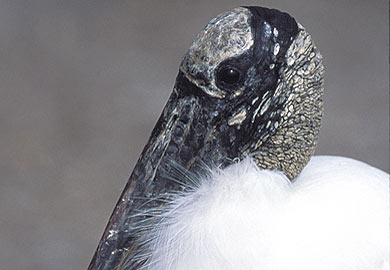DNR News
** Archived Article - please check for current information. **
September 11, 2015Boardwalk at Dungannon Plantation Heritage Preserve reopened
The boardwalk at the Dungannon Plantation Heritage Preserve (HP) has been reopened because the wood stork nesting season has concluded. All trails are open for public use. “A record high number of wood storks nested at Dungannon HP this year,” said Christy Hand, S.C. Department of Natural Resources (DNR) Wildlife Biologist. “A total of 282 stork nests were counted in the rookery and an average of over two chicks survived per nest, making it a very successful nesting season.”
Additional information about the 2015 wood stork nesting season will be posted on the DNR Wading Bird Project website this fall.
In 1984, wood storks (Mycteria americana) were listed as a federally endangered species after nesting pairs in the United States breeding population declined from between 15,000 and 20,000 in the 1930’s to 2,500 pairs by 1978. Thanks in part to the success of wood storks nesting in South Carolina; the species was reclassified as federally threatened during 2014. Historically, wood storks have used South Carolina as a post-nesting foraging area during the summer and fall. In 1981, the first successful wood stork nests were documented in South Carolina (11 nests). Currently, there are approximately 1,500 – 2,500 wood stork nests in South Carolina each year.
The Dungannon Plantation Heritage Preserve offers excellent habitat for many migrating and breeding songbirds and a variety of native wildflowers including large stands of wild Easter lily and five species of orchids. Dungannon HP is about 17 miles south of Charleston on SC Highway 162, four miles from the turn-off from US Highway 17. The management road system provides easy walking through open hardwood forest. No motorized vehicles are allowed. The preserve is open seven days a week during daylight hours.
More News
- Late-season migratory bird regulations set
- Shrimp-baiting season opens Sept. 11 in S.C. waters
- Boardwalk at Dungannon Plantation Heritage Preserve reopened
- SC Drought Response Committee conference call on Sept. 24
- DNR partners with QDMA for new deer decoy
- Public meetings scheduled to discuss deer management legislation
- Charleston County artificial reef grows
- Fishing to be improved at Lancaster County's Sunrise Lake
- DNR asks public to report sightings of banded wood storks
- Import of deer, elk parts into SC still limited by state regulation
- Aiken County wildlife area opens to the public Saturdays in September
- 27th Annual Beach Sweep/River Sweep set for Sept. 19
- Liberty Hill Wildlife Management Area (WMA) opening this fall
- DNR unveils new Spanish language website
- Submit a winning "Trashter Piece" and take home an iPad Mini 3
- Freshwater fishing trends
- Saltwater fishing trends
- S.C. weekly tidetable
- DNR video
- Archived news releases
